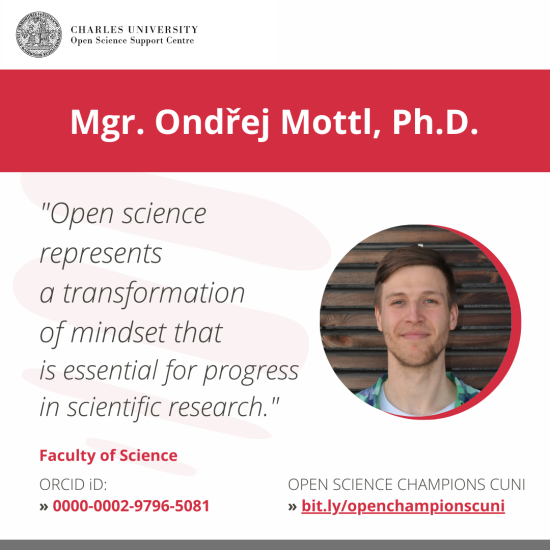 Department of Botany
Department of Botany
Faculty of Science
ORCID: 0000-0002-9796-5081
GitHub: OndrejMott
Twitter: @OndrejMottl
Open science was a natural next step in my scientific journey. However, I must admit that I started to engage more deeply with this topic only during my postdoctoral experience in Norway. This shift was likely connected to the fact that I had transitioned to being a data-focused researcher, and I was no longer generating ‘primary’ data, as I did during my PhD when I researched tropical ants and actively collected them on several continents.
The more I delved into the topic of open science, the clearer it became how fundamental this approach is to me. Even during my postdoctoral tenure, I started organizing workshops focused on reproducibility in science, and I continue to do so now at Charles University, where I lead workshops and have established a new course for students called “SPROuT – Science Powered through Reproducibility, Openness, and Teamwork.”
Currently, my research is based on reusing already published data, and I contribute to this process by publishing software that facilitates their analysis. Open science (including open data and software) has thus literally become a daily practice for me.
I actively engage with many aspects of open science, with a particular focus on analyzing vegetation patterns over time and space using already published data. Open Data is a key theme for me, as it affects data availability for research. It is incredibly frustrating when I discover that interesting data for studying vegetation trends exist but are not publicly accessible.
I develop software, mainly R packages, that facilitate the analysis of trends in ecology. These tools are freely available under the MIT license. My goal is to lower barriers in science and enable even those who are not statistics experts to easily analyze their data.
Reproducibility in science is a very personal topic for me, both as an author of scientific articles and as a reviewer of other scientific manuscripts. As I mentioned, I lead workshops where I share my knowledge and tools to facilitate this process.
Open science is not a dogma for me but rather a path that everyone chooses according to their own needs. As part of my development, I also started publishing my results in the form of preprints.
In my opinion, openness in science is the only way forward. Open science practices accelerate scientific progress. We are currently in the midst of a so-called ‘reproducibility crisis’ in science, and improving reproducibility through open science is, in my view, a clear step forward.
Definitely don’t be afraid to try. Practicing open science is a journey, and each of us is at a different stage of it. My personal goal is to ensure that every project is more open than the one before. The great thing is that if you are unsure about certain practices, information is publicly available, or you can reach out to the Center for the Support of Open Science here at Charles University.
Honestly, I think the situation is improving, and the overall mindset in science is gradually changing – we are talking about a so-called ‘open science revolution.’ But it takes time. There is still much to improve, for instance, in terms of thecommercialization of scientific journal publishing under the banner of ‘Open Access’ or the peer review process of grant agencies. These areas themselves present significant challenges.
Open science represents a transformation of mindset that is essential for progress in scientific research.

Residency, Invoicing and Correspondence Address
Charles University
Central Library
Ovocný trh 560/5
116 36 Prague 1
Czech Republic
Office Address
José Martího 2 (2nd floor)
160 00 Prague 6
Phone: +420 224 491 839, 172
E-mail: openscience@cuni.cz
Www: openscience.cuni.cz